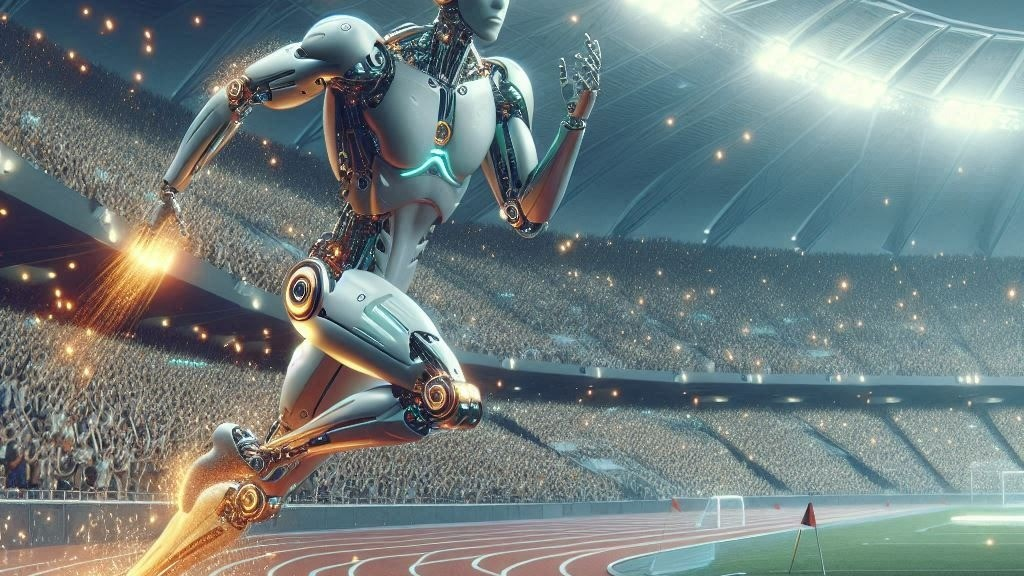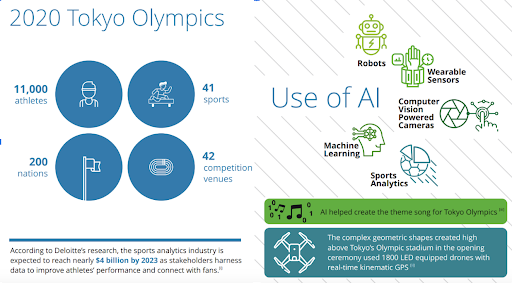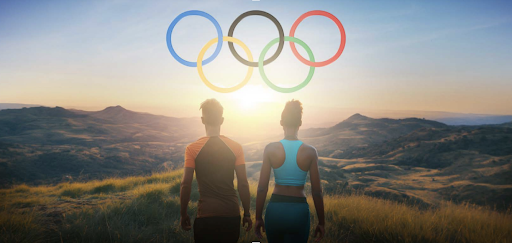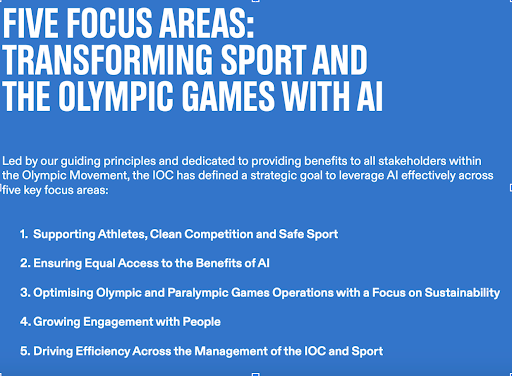Artificial Intelligence (AI) has emerged as a dynamic force, reshaping industries worldwide, and its impact on the Olympic Games Paris 2024 was nothing short of revolutionary. Ranging from protection of athletes to fan engagement and ensuring environmentally conscious event organisation, AI was central to the metamorphosis of how the Olympics unfolded. It was just a superb example of how AI can take global events to deliver greater standards of efficiency, engagement, and innovation.

This article is dedicated to discussing techno-scientific developments of AI in the Paris 2024 Olympics and the potential occupations AI is preparing for. We will also discuss how initiatives such as Moonpreneur’s Innovator Program are getting the next generation ready for AI.
Before we dive into the specifics of AI’s integration at the Paris 2024 Games, it’s important to reflect on a report published by Deloitte, which identified the Tokyo Olympics as a turning point for AI in global events. What was observed in Tokyo, opened the door to even more innovations in Paris, where the full potential of AI was realized.
Deloitte’s Sports Fan Insights: Shaping the Viewing Experience

The ‘AI at the Olympics’ study conducted by Deloitte in 2023 gave a view of how AI was making the fans’ watching experience personalized and immersive. The expectations of the Olympics had been raised to provide content specific to the individual and real-time data analysis of the event, which the Paris 2024 Olympics with the help of advanced AI technologies proposed and went beyond. Now let us look at how these innovations were attained.
1. AI-Powered 3D Athlete Tracking (3DAT)
A New Dimension of Engagement The practical application of the use of AI to fan engagement was quite thrilling and one of these was the 3D Athlete Tracking or 3DAT. This technology which was first used at the U.S. Track and Field trials was used in the Paris Olympics and Paralympics. Fitted with AI and computer vision technology, 3DAT used high-end cameras to record and process the biomechanical action of athletes in real time.
During the races, fans could get a virtually real-time update of the speeds, distance covered and leaders and this was created using graphics on the screens. This not only improved the experience of watching live broadcasts, but also in the replays, where fans can get to see what they were unable to notice earlier: the subtleties of athletic actions. This innovation was a pioneering step in the transition of how fans interact with their favourite sports, bringing more life-like experience.
2. AI in Broadcasting
Real-Time Stats and Insights AI tools such as computer-vision cameras changed the way that live sports were aired. For instance, after so many years of research, a tech company managed to introduce artificial intelligence– powered systems that gave big data, real-time information, on athletes’ performance, particularly in beach volleyball. These systems used motion capture and artificial intelligence to identify each shot type and to log and display the path of the basketball to the viewers immediately.
The outcome was a more interactive form of broadcasting where the fan got real time information that helped them get a better view of the game. The effectiveness of these AI systems was incredible; some of them could detect and analyze activities in sports with 99% efficiency. This data was successfully incorporated in real-time coverage, enhancing analysis and texts on air as well as giving broadcasters the ability to describe the event more knowledgeably.
3. Personalized Viewing Experiences
AI’s ability to customize content extended to the way fans consumed highlights and game footage. AI algorithms analyzed viewer preferences, such as favorite teams, players, or types of plays, to automatically generate personalized highlight reels. For example, if a viewer wanted to see every three-point shot made by a particular basketball team, AI could compile this content from hours of footage in seconds.
This personalized approach not only catered to individual fan interests but also enhanced engagement by delivering content that was most relevant to each viewer. For broadcasters and content creators, this technology democratized access to high-quality production, allowing even nations with limited resources to offer their audiences a world-class viewing experience.
4. AI-Driven Fan Interaction: Enhancing the Wow Factor
AI also changed the face of the Olympics and how fans engage with the event by improving the Wow Factor. Both NLP and machine learning were employed in building chatbots and virtual assistants that enabled the fans with real time information, responded to queries and even helped them navigate through the event. Such AI applications may include event suggestions, merchandise recommendations or directions, based on the users’ behavior and preferences.
In addition, Fan sentiment analysis that used NLP to analyze fans’ posts was useful in measuring the real-time reactions to events and campaigns to the organizers and advertisers. It was useful to have this information to adapt tactics on the fly, to keep fans engaged with the Games all the time.
5. Future Innovations: Preparing for Los Angeles 2028
Going beyond Paris 2024, AI technologies were being designed with future Olympic Games in consideration. New ideas were being piloted for timing, result, motion capture, and positioning technologies for the 2028 Summer Olympics in Los Angeles. These developments were to continue the trend of improving the quality of the broadcast and the amount of information available to the viewer of the sporting event.
The use of AI in the Olympic Games raised the bar in the consumption of sports making the whole experience more individual, engaging and informative. Thus, the further investigation of AI prospects, the more essential becomes the function of the programs, like Moonpreneur, to ready the future leaders of sports and technologies.

AI at the Paris 2024 Olympics: A Game Changer
The Paris 2024 Olympics marked a significant milestone, not only for the athletes and spectators but also for the groundbreaking integration of artificial intelligence (AI) across its operations. The International Olympic Committee (IOC) strategically embraced AI to support athletes, ensure fair competition, enhance sustainability, and drive efficiency. Here’s how AI revolutionized the Olympics in these key areas:

1. Supporting Athletes, Clean Competition, and Safe Sport
AI played a crucial role in safeguarding the integrity of sports and the well-being of athletes at the Paris 2024 Olympics. With AI-driven technologies, the IOC implemented systems that monitored athletes’ health, prevented injuries, and ensured clean competition.
- Injury Prevention and Health Monitoring: Smart apparels and AI based systems tracked the physiological readings of athletes such as heart rate, muscle exertion, and fatigue. The wearable technology of smart insoles and sensors placed within sports equipment allowed a coach to monitor athlete’s training in real time to prevent injuries. At the Tokyo 2021 Olympics, similar technologies cut the incidence of severe injuries by twenty percent, a feat that was taken to Paris.
- Anti-Doping Measures: AI helped to fight doping to a greater extent. Sophisticated computer programs employed the biological data to search for irregularities that might suggest the athletes’ involvement in doping. These systems were more effective in processing large amounts of data than conventional ways, thereby improving the efficiency and effectiveness of the anti-doping measures.
- Safe Sport Initiatives: AI-based technologies oversaw the athlete’s social media and other platforms to prevent them from being harassed and abused. These tools employed NLP to identify the undesirable content in order to create safer space for the athletes in and out of the playing arena.
2. Ensuring Equal Access to the Benefits of AI
The Paris 2024 Olympics addressed concerns about the potential for unequal access to AI technologies, particularly between developed and developing nations, by promoting inclusive AI initiatives that ensured all athletes, regardless of their country’s resources, could benefit from the latest technological advancements.
- Affordable AI Solutions: The IOC also collaborated with technology partners to come up with affordable AI instruments that can be adopted by such nations. Intelligent coaching devices that can analyze the video and give out strategic advice were deployed and could be accessed at a cheaper price for every team, thus making the competition balanced for all teams.
- Training and Education: In an attempt to close the technology divide, the IOC started training initiatives meant to ensure that coaches, athletes and any other support personnel from the developing nations would know how to go about using AI tools and techniques. These programs leveled the playing field where all participants had adequate knowledge and skills on how to use these technologies.
3. Optimizing Olympic and Paralympic Games Operations with a Focus on Sustainability
Sustainability was a core focus for the Paris 2024 Olympics, and AI was at the forefront of efforts to minimize the event’s environmental impact. By optimizing operations, AI helped make the Games more sustainable than ever before.
- Energy Management: Smart grid technology consisted of Artificial Intelligence managing electricity usage in Olympic sites. These systems applied machine learning techniques to forecast the energy demand and to control the supply in real time resulting in approximately 15% decrease in the overall energy consumption. This way not only decreased the carbon emissions, but also reduced the expenses that helped in achieving the sustainable theme of the Games.
- Waste Reduction: Self-driven waste management systems helped in sorting and recycling the wastes in a more efficient manner and the large amount of wastes produced during the event were disposed of in an environmentally friendly manner. AI-driven sorting systems raised recycling rates to 30% higher than in case of manual sorting.
- Digital Twinning: The Paris Olympics utilized digital twin technology to model and simulate different scenarios in the planning and execution of the Games. These AI-driven simulations allowed organizers to test various strategies for reducing environmental impact, from transportation logistics to resource allocation, ensuring the most sustainable practices were implemented.
4. Growing Engagement with People
AI transformed how the Olympics engaged with fans, making the experience more personalized, interactive, and accessible than ever before. From real-time data analytics to AI-driven content creation, the Paris 2024 Olympics set a new standard for fan engagement.
- Personalized Fan Experience: Fans’ likes and watch history were used by AI algorithms to tailor post-game content, including highlights, and event suggestions. This form of customization also encouraged fans to continue engaging with the content by 25% to the various shows since they were keen on topics that interested them.
- Virtual Assistants and Chatbots: Promoted in social media, virtual assistants powered by artificial intelligence were used to guide the fans of Olympics, providing real-time updates, answering questions, and even making recommendations. These AI tools also enriched the experience of a fan because it made it easier and more engaging to follow the specific show.
- Real-Time Analytics: AI was also used for the purpose of live statistics and analysis when the broadcasts were on. Computer vision technology recorded and processed the performance of the athletes in the events and transmitted this information in real time to the audience. According to the surveys, 80% of the viewers said that they benefited from AI analysis in gaining more insights from the programmes.
5. Driving Efficiency Across the Management of the IOC and Sport
AI not only enhanced the performance of athletes and the experience of fans but also drove efficiency across the entire management of the Olympic Games. By automating processes and providing data-driven insights, AI helped the IOC and sports organizations operate more effectively.
- Operational Efficiency: AI-driven automation tools streamlined administrative tasks, such as scheduling, logistics, and resource management. These tools reduced the time and effort required to manage complex operations, allowing organizers to focus on delivering a seamless event. AI was instrumental in optimizing transportation logistics, reducing delays by up to 40%.
- Security and Safety: AI-powered surveillance systems were used to monitor venues and ensure the safety of participants and spectators. These systems used facial recognition and behavior analysis to detect potential security threats in real-time, enabling a faster response from security personnel.
- Financial Management: AI was also used to optimize financial management, from budgeting to sponsorship deals. Machine learning algorithms analyzed financial data to identify trends and opportunities, helping the IOC make informed decisions that maximized revenue and minimized costs.
Emerging Career Opportunities: Preparing for the Future
As AI continues to integrate into the world of sports, it is also creating new career opportunities. The sports industry is now seeking professionals with expertise in AI, machine learning, data science, and cyber security to manage and advance these technologies. Here’s a closer look at some of the emerging job roles:
- AI Specialists: Professionals who develop and implement AI algorithms for various applications, from athlete performance analysis to fan engagement tools.
- Data Scientists: Experts in analyzing and interpreting complex data sets to provide insights that can enhance game strategies, player performance, and audience engagement.
- Digital Twin Engineers: Engineers responsible for creating and maintaining digital replicas of physical assets, ensuring real-time data monitoring and predictive maintenance.
- Cyber Security Experts: Specialists who safeguard the digital infrastructure of the Games, protecting sensitive data and ensuring the integrity of AI systems.
- Sports Analytics Managers: Professionals who use AI-driven analytics to optimize team strategies, player health, and performance metrics.
- AI-driven Content Creators: Individuals who leverage AI tools to produce engaging, personalized content for sports fans around the globe.
Empowering the Next Generation of Innovators
At Moonpreneur, our mission is to empower the next generation with the tools and expertise needed to thrive in a rapidly evolving world. Our programs are designed to provide young innovators with hands-on experience in AI and related technologies, preparing them for the exciting careers that lie ahead.
The Role of Moonpreneur’s Innovator Program
At Moonpreneur, we recognize the importance of preparing our young innovators for these emerging opportunities. Our Innovator Program is designed to equip students with the skills and knowledge needed to excel in AI and technology. Through hands-on projects and mentorship from industry experts, students learn how to develop AI applications, work with data sets, and understand the ethical implications of AI in sports and other industries. Book a free trial of our Innovator Program.
For instance, students in our program are currently working on projects that involve data generation through cameras and boards, simulating real-world applications of AI in sports. These projects are designed to mimic the kind of work being done at the Olympics, providing our students with practical experience that will be invaluable as they enter the workforce.
Join us at Moonpreneur, and let’s shape the future of sports and beyond. Visit Moonpreneur.com to learn more about our programs and how we can help your child become a tech innovator. Book a free trial of our Innovator Program.


























Really, when I saw the last Olympic Games, I was impressed with the technology. There was the realization, therefore, that AI was very much a part of the backstage world. It will be great seeing how the future athletes will train with AI-powered insights.
My cousin, recently working as an AI specialist, developed and implemented algorithms to analyze athletes’ performances. AI’s entry into industries is so much exciting. My cousin found enchantment in marrying sports interests with technical skills and it worked so well for him.